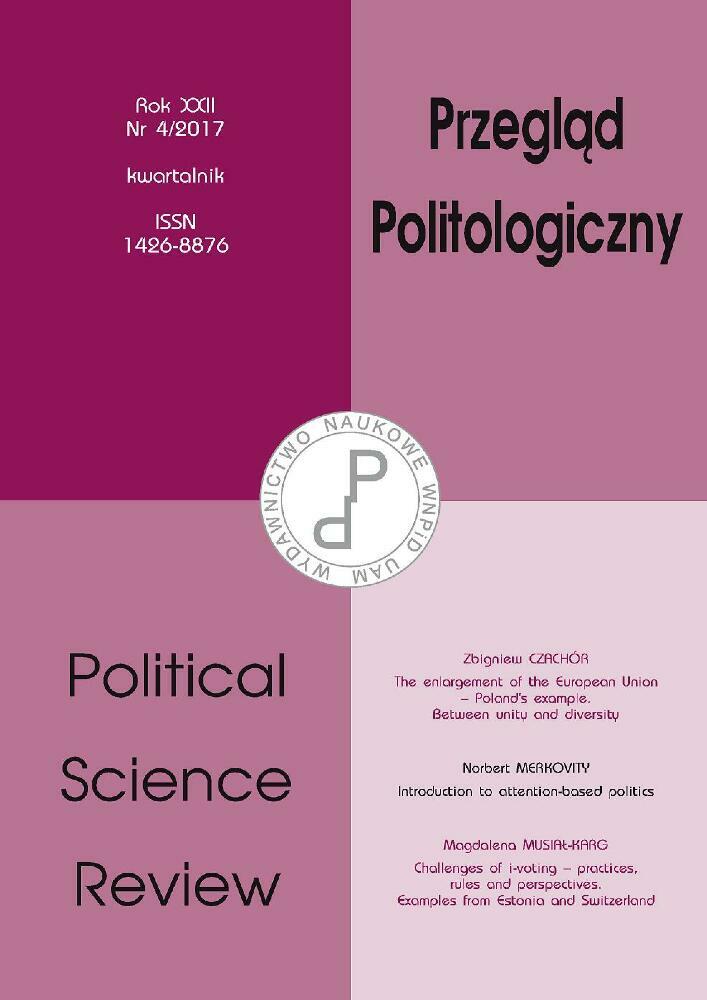Abstrakt
The research applies a method of sources analysis that draws upon a qualitative comparative study of three speeches delivered by Russia’s President Vladimir Putin during his annual news conferences. It aims to solve the problems: how was political gnosis changing in Putin’s statements over the subsequent 2014–2016 meetings? And how was Putin triggering off a performative potential of presumably non-gnostic elements of discourse to enhance political gnosis? It identifies the drift from authoritarian to totalitarian and democratic gnosis and recognizes a moderate extent of the intensity of political gnosis. The article contributes to political sociology by creating and testing the empirical effectiveness of a research tool for measuring the types and intensity of political gnosis, and distinguishing between political diagnosis and gnosis.
Bibliografia
Barceló J. (2017), National Personality Traits and Regime Type: A Cross-National Study of 47 Countries, “Journal of Cross-Cultural Psychology”, vol. 48, no. 2.
Bäcker R. (2016), Kategorie teoretyczne totalitaryzmu a badania empiryczne, “Studia nad Autorytaryzmem i Totalitaryzmem”, vol. 38, no. 2.
Colgan J. D., Lucas E. R. (2017), Revolutionary Pathways: Leaders and the International Impacts of Domestic Revolutions, “International Interactions: Empirical and Theoretical Research in International Relations”, vol. 43, no. 3.
Dyson S. B., Parent M. J. (2017), The operational code approach to profiling political leaders: understanding Vladimir Putin, “Intelligence and National Security”, Published online: 11.04.2017.
Fagerholm A. (2016), Ideology: A proposal for a conceptual typology, “Social Science Information”, vol. 55, no. 2.
Heydari A., Davoudi I., Teymoori A. (2011), Revising the assessment of feeling of anomie: Presenting a multidimensional scale, “Procedia – Social and Behavioral Sciences”, vol. 30.
Kolstø P. (2016), Crimea vs. Donbas: How Putin Won Russian Nationalist Support – and Lost It Again, “Slavic Review”, vol. 75, no. 3.
Martin R. (1997), Democratic Institutions, Oxford Scholarship Online. http://www.oxfordscholarship.com/view/10.1093/0198292937.001.0001/acprof-9780198292937-chapter-7, 22.07.2017.
Miley T. J. (2011), Franquism as Authoritarianism: Juan Linz and his Critics, “Politics, Religion & Ideology”, vol. 12, no. 1.
Miley T. J. (2015), Constitutional Politics and Religious Accommodation: Lessons from Spain, “Politics, Religion & Ideology”, vol. 16, no. 4.
Motimele M. (2017), Political representation and non-citizenship: the impact of excluded subjects on democratic frameworks of representation, “Representation”, Published online 10.07.2017.
Putin V. (2014), News conference of Vladimir Putin, 18.12.2014, Official Internet Resources of the President of Russia, http://en.kremlin.ru/events/president/news/copy/47250, 21.04.2017.
Putin V. (2015), Vladimir Putin’s annual news conference, 17.12.2015, Official Internet Resources of the President of Russia, http://en.kremlin.ru/events/president/news/copy/50971, 21.04.2017.
Putin V. (2016), Vladimir Putin’s annual news conference, 23.12.2016, Official Internet Resources of the President of Russia, http://en.kremlin.ru/events/president/news/copy/53573, 21.04.2017.
Roberts K. (2017), Understanding Putin: The politics of identity and geopolitics in Russian foreign policy discourse, “International Journal”, vol. 72, no. 1.
Sussex M. (2017), The triumph of Russian national security policy? Russia’s rapid rebound, “Australian Journal of International Affairs”, Published online 09.07.2017.
Voegelin E. (1987), The New Science of Politics: An Introduction, The University of Chicago Press, Chicago–London.
